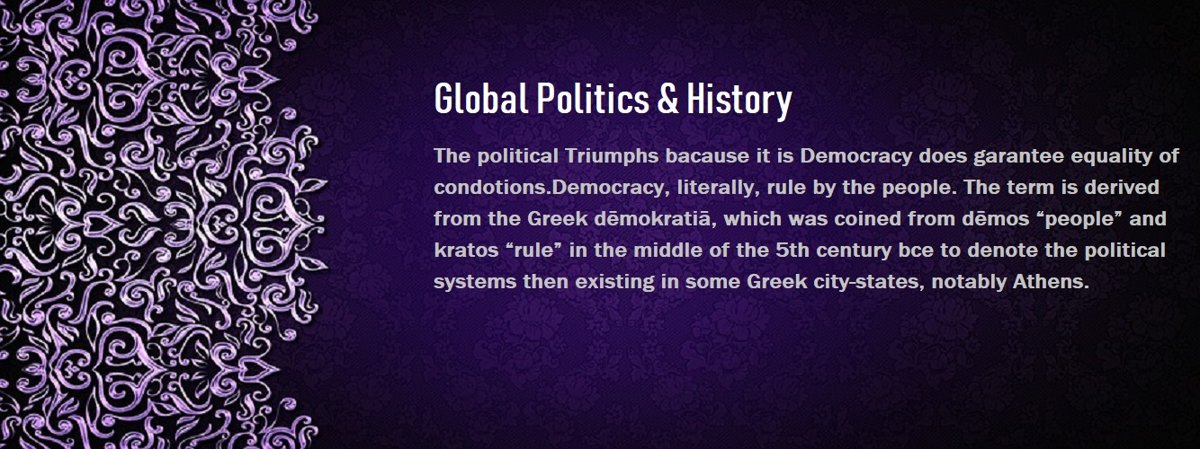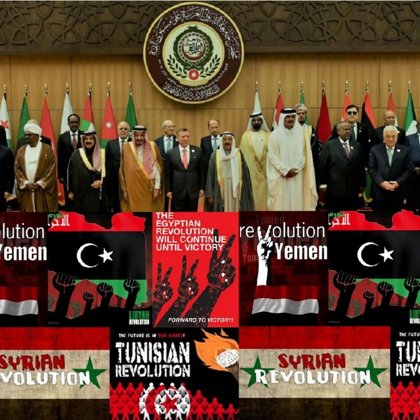OIL,RIVALRY AND ENVY CAUSED " THE FALL OF ARAB SPRING ERA ".THE ARAB SPRING LED TO A NUMBER OF SO - CALLED REVOLUTIONS IN THE ARAB WORLD GOVERNMENTS OF OLD WERE OVERTHROWN AND NEW FACTIONS LED FOR POWER.HOW THE SAUDI-QATARI RIVALRY HAS FUELED THE WAR IN SYRIA AND YEMEN ?
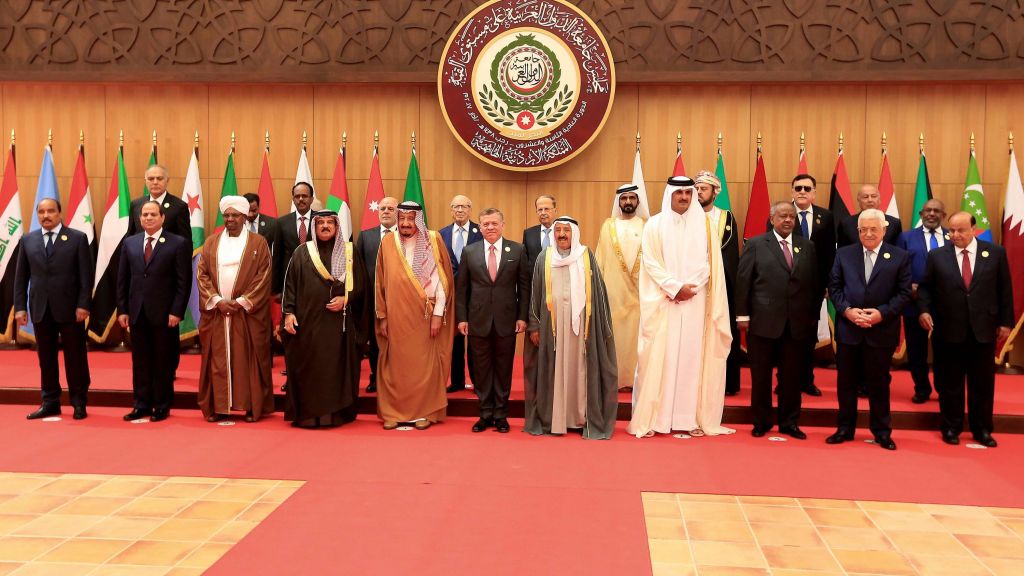 From Syria to Arabia to Morocco, Arab people denounce the dispiriting reality of the Arab League knowing that it is a reflection of uneven relations between most Arab states. Actually, the general political, economic and cultural levels of cooperation between many nations are below the baselines of ordinary formal relations. Nonetheless, when it comes to state-relations among one ethnic group of countries or league of states, Arab-Arab relations are very frail despite the flimsy cosmetic role of the Arab League.
From Syria to Arabia to Morocco, Arab people denounce the dispiriting reality of the Arab League knowing that it is a reflection of uneven relations between most Arab states. Actually, the general political, economic and cultural levels of cooperation between many nations are below the baselines of ordinary formal relations. Nonetheless, when it comes to state-relations among one ethnic group of countries or league of states, Arab-Arab relations are very frail despite the flimsy cosmetic role of the Arab League.
Bringing back into memory the tragedy of 1948 when Arab countries alongside the Arab League couldn’t recapture the Palestinian land from Israel nor were diplomatically shrewd enough to deal with the Palestinian cause on the international theater. Again, twenty-two years later, in September 1970, the Arab League was unable to find a solution to the dramatic armed conflict between Jordan and the Palestinian Liberation Organization (PLO), which led to the expulsion of the armed PLO from Jordan to Lebanon and other neighboring countries.Add up that the Arab league was impotent for around 20 years, from 1975 to 1989, before it could formulate a solution to Lebanon’s seventeen-year-long civil war. Again, in 1990, the LAS and Arab counties could not manage to solve the Iraqi -Kuwaiti dispute over oil, which led to the foolish Iraqi invasion of Kuwait and its detrimental consequences on the Arab world. Time and again, the Arab world and its league came short to defuse the unjustified U.S war on Iraq in 2003; or to contain the Syrian belligerence after their involuntary withdrawal from Lebanon in 2005; or to mediate a solution to the Sudanese problem before the UN bisected Sudan in 2011; or to de-escalate the Iranian Shiite insurrection in Bahrain.Saudi Arabia has been at the forefront of a dispute with Qatar since June 5, leading a group of nations including Bahrain, Egypt, and the UAE, in accusing Doha of supporting terrorism.Riyadh has for its part been accused of being behind last weekend’s resignation of Lebanese Prime Minister Saad Hariri, in a televised address from Riyadh.A statement from Lebanese President Michel Aoun claimed that Hariri is being held in Riyadh, with restrictions on his freedom, MTV Lebanon reported.Lebanese officials have insisted on the return home of Hariri from Saudi Arabia amid rumors he is being held against his will.The league's decision marked a watershed for a consensus-based organisation that is often criticised for being toothless because it reaches decisions based on a lowest common denominator thus the surprise at the robust support of 18 of its 22 members for the Syrian suspension. Opposition came only from Syria itself, Lebanon and Yemen, Iraq abstained.The uprisings also deposed, came close to deposing, or ended the lives of, the leaders of Tunisia, Egypt, Syria and Libya.The Middle East is experiencing a revolution as citizens in country-after-country seize control of their societies. In Tunisia and Egypt, this has meant the forced resignation of a longstanding dictatorship. In Libya, Yemen, Bahrain, and Syria, it has meant armed conflict, even civil war. As with all revolutions, the final outcome is hard to predict, but we can be sure that the region will not return to circumstances of the recent past. Moderate secular rulers will not be able to cow their citizens and live off the fat of oil exports and American aid. The new leaders of the Middle East will have to show that they can serve their citizens in ways their predecessors never did.Libya and Syria have become the poster children for the varied impacts that the so-called Arab Spring have had on the Islamic Middle East. They are not the most important countries to have undergone changes (Egypt, the outcome of whose upheaval remains a work in progress, can claim that distinction), but they do represent the most polar outcomes that the popular uprisings have produced to date. In Libya, the rebels–with the generous and probably critical assistance of Western militaries–have succeeded in dislodging long-time ruler Muammar Gaddafi, whose whereabouts remain a mystery of the Carmen San Diego variety at this point. In Syria, the regime of Bashar al-Assad remains in power in the face of worldwide condemnation but little effective action, and seems likely to remain so for the foreseaable future.The countries and their situations are a study in similarities and contrasts. Both are, of course, majority Sunni countries (as are most Muslim states), both have a diverse population that is tied together by common religion, both have long-standing traditions since achieving statehood of authoritarian rule in which the military has played a prominent role, and both have ties (admittedly of different varieties) to international terrorism. On the face of it, Syria is in many ways the more important country by virtue of size (71,500 square miles of territory to Libya’s 43,000 square miles), population (22 million to 6.5 million) and strategic location: Syria has long borders with Iraq and Turkey and less lengthy borders with Lebanon, Jordan and Israel, whereas Libya borders six North African countries, the only one of which that has strategic significance being Egypt.There is, of course, one very significant difference between the two which explains the highly differential way the international community has reacted to demands for political change in the two countries. That difference, of course, is that Libya has a large amount of very desirable petroleum, and Syria does not. The contrast is enormous. Using CIA World Factbook figures, Libya exports approximately 1.5 million barrels a day (15th largest in the world), while Syria exports 155,000 barrels a day, about one-tenth of the Libyan figure and 56th in the world. Known Libyan reserves stand at 47 billion barrels, comparecto 2.5 billion for the Syrians. Moreover, Libyan oil is relatively cheap to extract and is particularly “sweet” (low-sulfur content), a particularly important factor for Europeans who have geared their refineries to processing sweet crude and can only deal with other oil with considerably more difficulty and expense.Oil production has driven the economies of the two countries in opposite directions. Libyan GDP per capita, for instance, is about $14,800 (84th in the world), and while it is distributed in an unequitable manner of which the Tea Party would be proud and Ayn Rand disciples envious, it is considerably higher than in Syria, with a per capita GDP of $4,800, 151st the in the world. Prior to the revolution, Libya was a classic “petrolist” state (to borrow Thomas L. Friedman’s term), where huge oil revenues (95 percent of export earnings, 80 percent of government revenues) were used to buy off the population and blunt its democratic urges. Petrolist success took a hit with the success of the revolution in Libya.Libya has succeeded in throwing off its shackles for the moment, and Syria has not. The outcome in Libya is far from ordained, and could vary from a total democracy to the rise of a new dictator: prudence suggests somewhere in between, whatever that may mean. The al-Assads cling to power, and despite universal pleas for them to cease their repression and to step down, Bashar al-Assad shows no indication he will do either. Nobody wants to talk about his success in holding power, but it is not unlikely, at least in the short run.The key element in Libyan success and Syrian failure is outside pressure. Put simply, it is highly unlikely that the Libyan rebels would have succeeded without the covering air power of NATO to suppress government forces (attacking them directly, preventing their forays against rebel units in the field intent on their destruction). These rebels, it must be remembered, were a pretty woebegone, rag-tag coalition when they began, and the early prognosis for them was not good until NATO airpower shifted the balance of power. There has, to put it mildly, been nothing like that in support of Syrian dissidents who are, as best one can piece together from media reports, been treated much more harshly than the Libyan government treated its citizenry. Why the difference?The answers, of course, are pretty obvious. The first and overwhelmingly most important is that Libya has something the outside world wants (oil), and Syria does not. This makes Syria, despite its geography and demographics, much less important to the world–and specifically to the countries that can militarily interfere–than Libya. The fact that Libya is a short and undefended flight across the Mediterranean Sea from Libya and that effective assistance did not include putting boots on the ground and thus creating the possibility of many casualties, added to the ease of making the decision to help Libya but not Syria. Any actions against Syria are likely to have to come from neighbors, who show neither the interest nor capability to tangle with the regime in Damascus. Human rights violations alone are simply not enough.The other element has been that the coercive capacity of the Syrian government has proven more capable and resilient than that of Libya. On the face of it, the Libyans has the wherewithal to expunge the rebels but could not. Part of the reason was geographic , and traversing the terrain meant crossing open territory and being left vulnerable to NATO air power. Partly, however, the Libyans seemed less capable. For the time being, Syrian brutality has succeeded; it may not in the longer run, but for the moment, the Syrians have held the line.None of this suggests how the revolutions in either country or the region will come out. There are simply too many variables, someforeseeable and others not, that could influence the ultimate outcomes. Roughly nine months after the Arab Spring erupted in Tunisia and spread through the region, however, the experiences in Libya and Syria do suggest the range of possible outcomes.
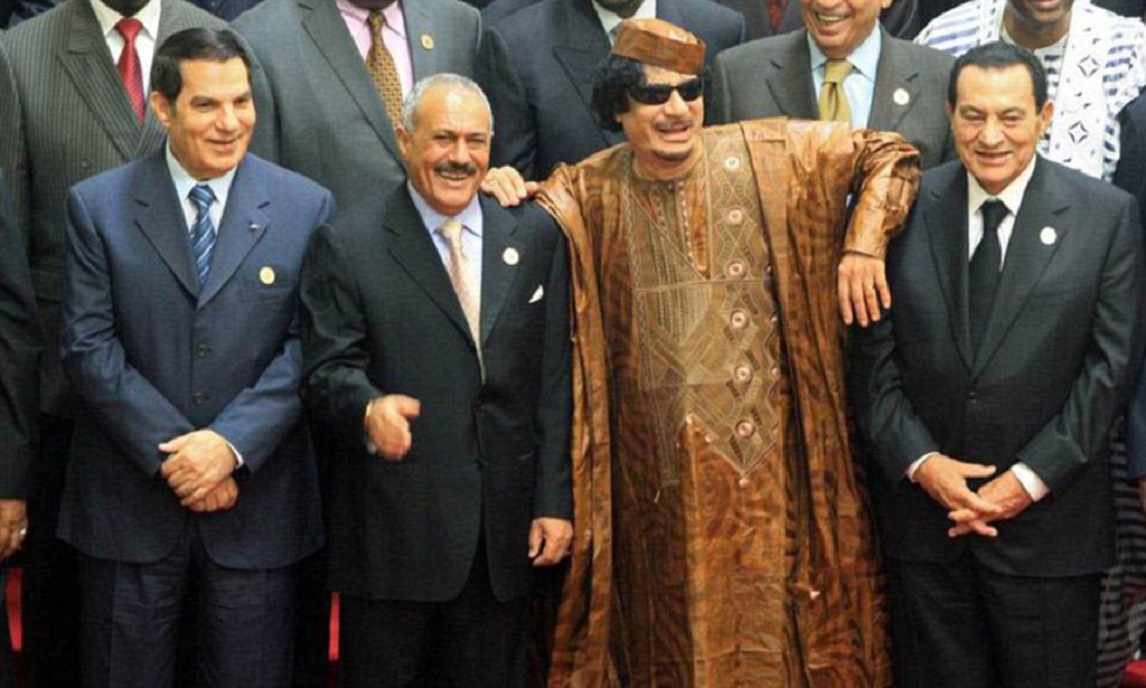 Arab leaders smile before the ‘Spring’,Libyan leader Muammar Gaddafi, center, flanked on his right by Egyptian President Hosni Mubarak.A look at Arab interrelations will reveal a general case of mistrust, hidden antipathy and involuntary cooperation, most of which stem from the interference of one state in the national affairs of another. A review of Arab-Arab relations will unmask a history of confrontational relations and political conflicts while the Arab League was a wary bystander.
Arab leaders smile before the ‘Spring’,Libyan leader Muammar Gaddafi, center, flanked on his right by Egyptian President Hosni Mubarak.A look at Arab interrelations will reveal a general case of mistrust, hidden antipathy and involuntary cooperation, most of which stem from the interference of one state in the national affairs of another. A review of Arab-Arab relations will unmask a history of confrontational relations and political conflicts while the Arab League was a wary bystander.
Syria's crisis has entered uncharted waters with the country's suspension from the Arab League. But it is far from clear whether the dramatic shift in the regional mood will change wider international attitudes to intervention.Syria's suspension from the Arab League leaves Assad isolated.The Tunisian success in getting rid of Ben Ali was followed in Egypt by the resignation of president Hosni Mubarak in February 2011, by Colonel Muammar Gaddafi’s death in Libya the following October, and by the departure of president Ali Abdullah Saleh from Yemen in February 2012. Four autocrats gone in just over a year.Algeria,has not embraced radical change. The government has checked public rage through a combination of measured tolerance, food subsidies and pay raises, as well as small political concessions.Bahrain,the government's clampdown on a largely peaceful uprising that began in February continues. In March, about 1,200 Saudi troops entered Bahrain followed by 500 police officers from the UAE under a Gulf Cooperation Council mandate. While there have been some conciliatory gestures, including the promise of a national dialogue and the lifting of a state of emergency, individuals linked to the protests - including key political figures and 48 medical professionals are being tried in military courts. Hundreds still remain in detention and opposition supporters have been dismissed from their jobs. The opposition may have been weakened, but antipathy towards the regime deepens.Egypt,the revolution has left widespread uncertainty about the country four months after protesters toppled Hosni Mubarak. The economy has collapsed with tourists afraid to visit without a functioning police force and only one political party - a group that is the Muslim Brotherhood in all but name has been officially registered. Dozens of other groups are vying for power, but few have risen to the level of professional politics. The revolutionary youth that led the uprising have yet to coalesce around a candidate or a political platform. Egypt has tentatively set parliamentary elections for September, but there are disagreements over this, too. A criminal trial of Mr Mubarak is set for August and Egyptians hope they can move on after a full reckoning of the workings of his secret police state.Iran,Iran's regime hailed the Arab Spring, but attempted to portray it as an anti-Western "Islamic awakening" inspired by its 1979 revolution. If Iran did set a precedent, it came from the reformist "Green Movement", which was ruthlessly suppressed after President Mahmoud Ahmadinejad's disputed re-election triggered mass pro-democracy protests two years ago. Despite its bravado, the regime remains concerned these could erupt again, given the climate of change in the region. Meanwhile, the regime's hardline ruling elite has been torn by a highly damaging power struggle. Tehran is also concerned by the pressures facing President Bashar al-Assad in Syria, Iran's only Arab ally and its gateway to the Middle East.srael and Palestinian Territories,with popular revolts raising hopes for a more democratic Middle East, Israelis and Palestinians, on the other hand, seem more divided than ever, dimming hopes for a negotiated solution to their conflict. Addressing the US Congress last month, Israel's prime minister, Benjamin Netanyahu, gave his "three no's" to issues that Palestinians demand for a final peace accord; no division of Jerusalem with a future Palestinian state; no right of return for Palestinian refugees; and no return to the boundaries that prevailed before the 1967 Arab-Israeli war. Pressure by popular Palestinian demonstrations starting in March, meanwhile, has helped to convince the West Bank's Fatah faction and its rival in the Gaza Strip, Hamas, to end their four-year split. Their May 4 reconciliation accord has angered Israel, which, along with the US and EU, call Hamas a terrorist organisation. But it has enabled Fatah's chairman, Mahmoud Abbas, also the Palestinian Authority president, to present a firmer case for a UN endorsement of a Palestinian state ,Jordan,Jordanians are waiting for promised reforms to take effect. Protests have been mostly peaceful, but one man died and dozens were injured on March 24 in Amman. Protesters want constitutional amendments that curb the king's powers, eliminate corruption and improve living standards. Protests continued even after a national dialogue committee was created. King Abdullah II offered concessions in a televised speech . He said he supports a proposed law that would establish a government that would provide substantial powers to elected officials. But no timetable has been set. Most of Jordan's 18 political parties remain weak and fragmented and do not enjoy wide popular support.Kuwait,Kuwait's opposition has been holding sporadic rallies against the prime minister since 2009, but the size and regularity of the protests has increased in the past two months, sometimes attracting thousands. The emir said in a speech on Tuesday that the minister of interior has been told to adopt "all necessary measures" to protect the country's stability. Rulers have tried to appease citizens by sharing the emirate's oil wealth. In February, all citizens were given 1,000 Kuwaiti dinars and free food staples for more than a year.Lebanon,Lebanon has been comparatively calm, but the Arab Spring has added to the country's atmosphere of uncertainty. After five months without a functioning government, Lebanon has a new cabinet, one that is seen as pro-Syrian. The Arab Spring revolt against Syria's Assad regime continues to rattle nerves in Lebanon - something that is even more relevant with Lebanon's new but fragile political arrangement. Meanwhile, secular activists continue to seek inspiration from the Arab Spring to re-energise efforts to bring down Lebanon's entrenched sectarian system of governance.Libya,Anti-government protests in February spiralled into armed revolt, with rebels seizing Benghazi as Libyan leader Colonel Muammar Qaddafi vowed to defeat them or die fighting. A rebel leadership council in Benghazi has won diplomatic recognition from several western and Arab governments, including the UAE. Rebel fighters control much of eastern Libya, the city of Misurata and the Nafusah mountains. Nato has enforced a UN-mandated no-fly zone since March and battered Col Qaddafi's military with air strikes. But finger-pointing over member states' level of commitment has strained the alliance. Col Qaddafi's regime has called for a ceasefire, although he himself has refused to step down.Morocco,young Moroccans inspired by Tunisia's revolution launched Facebook-driven demonstrations in February condemning corruption and calling for limits to the power of King Mohamed VI. The king has promised a new constitution that would enhance the roles of political parties and parliament, and create an independent judiciary. That constitution is expected to be unveiled this month and put to a referendum . Authorities have tolerated some protests, while sending baton-wielding police to disperse others and branding protest leaders as leftist and Islamist extremists. Protest supporters are an unlikely coalition including left-leaning political parties, trade unionists, human rights groups, independent activists and a Sufi-inspired Islamist movement.Oman,like many rulers, Sultan Qaboos bin Said embarked on some reforms while using force against protesters. Protests began in December; the last one was May 6. Two protesters have been killed and more than 100 injured. More than 200 were arrested and 27 are now on trial. In March, the sultan promised cede some legislative powers to the partially elected Shura Council, an advisory body. The government responded by spending money for 30,000 more jobs and 40 per cent more scholarships. The government has sacked some long serving ministers. Many people would like to see cabinet ministers appointed from the elected members of the Shura Council but few are confident that it would ever happen.Qatar,rumours of protests in Qatar spread "The Freedom Revolution" attracted more than 30,000 followers, causing the British Foreign and Commonwealth office to warn Britons not to attend gatherings. As the date approached, the page switched to a pro-government stance for unknown reasons. It published hundreds of posts supporting the rulers and blaming foreign Arabs for conspiring to arrange the protest. The demonstration never materialised and there have been few other signs of discontent from Qataris, who have one of the highest gross domestic products per capita in the world.Saudi Arabia,there have been several petitions to the king signed by Saudis demanding political reforms to create a constitutional monarchy, and the country's first political party was established - and then suppressed. There have been regular peaceful demonstrations by Shiites in the Eastern Province and by Sunnis in Riyadh demanding the release of prisoners held without trials. The government has controlled most dissent because it has doled out $130 billion (Dh477bn) in financial benefits; state-supported clerics have reminded Saudis that demonstrations are not only illegal but also un-Islamic; and the Interior Ministry has arrested dissidents or people organising protests. Everyone is waiting to see what happens today when Saudi women say they will begin driving cars.Syria,president Bashar al Assad was confident the Arab Spring would not arrive in Syria but when it did, his security forces moved to stamp it out. But escalating use of force has failed to prevent dissent from spreading nationwide. However, just as the regime has been unable to decisively crush dissidents with what the UN has called "horrific attacks", demonstrators have been unable to bring decisive pressure to bear on the regime. Both sides believe they will prevail. The government says the opposition are Islamic insurgents who will soon be destroyed by the army; dissidents say the regime's archaic dysfunctions and a flatlining economy have already sealed its fate. The result is bloody stalemate.Tunisia,tunisians are proud that the Arab Spring was born in their country but change is not coming fast enough. The interim administration has set October 23 for elections to an assembly that will draft a new constitution. The political scene is fragmented, with more than 90 parties. The Islamist Ennahda movement, banned under ousted president Zine el Abidine Ben Ali, appears to be the most organised. Secularists are worried that Islamists will take control. Nonetheless, a poll shows that more than 70 per cent of Tunisians are confident in the future. Mr Ben Ali and his wife, Leila Trabelsi, are scheduled to go on trial Tuesday for stealing from the government and contributing to the deaths of protesters. They are in exile in Saudi Arabia and will not attend.Turkey,it has urged Arab governments to undertake genuine reform. But its foreign policy of "zero problems with the neighbours" is being tested. An ally of Syria, Turkey is having to cope with the repercussions of the Syrian crackdown. First, Turkey is dealing with almost 10,000 refugees from Syria. Second, its alliance is fraying as Turkey increasingly criticises the violence. Turkey also tried to mediate early in Libya but so far its diplomacy has failed. Nato's only predominantly Muslim member, Turkey initially criticised Nato air strikes but it now has naval forces involved in the Nato effort.UAE,no one has demonstrated much appetite for change. The government has increased the number of eligible voters for the August elections for the Federal National Council. In April it arrested five activists who organised a petition calling for greater political liberalisation. It also dissolved the boards of two professional associations, one of jurists and one of teachers, which had participated in the petitions. In March, it sent 500 police to Bahrain to help the Sunni king there quell Shiite protests. It sent military aid to the Libyan rebels and has officially recognised their governing council as Libya's legitimate government.Yemen,peaceful student protests in January have evolved into deadly tribal fighting throughout much of the country. More than 200 people have been killed in Yemen since protests began five months ago. President Ali Abdullah Saleh initially offered concessions, including to step down at the end of the year, but these measures were rejected. As protests worsened, the regime applied more force and suffered defections from key leaders. The Gulf Cooperation Council continues to try to mediate a transfer-of-power agreement that would require Mr Saleh to resign but grants him and close allies immunity. He verbally agreed to sign it but has reneged three times. The conflict erupted into tribal warfare. Mr Saleh was wounded in a rocket attack and remains in Saudi Arabia for medical care. Diplomats continue to negotiate with the regime and opposition leaders. The Yemen economy has worsened dramatically.
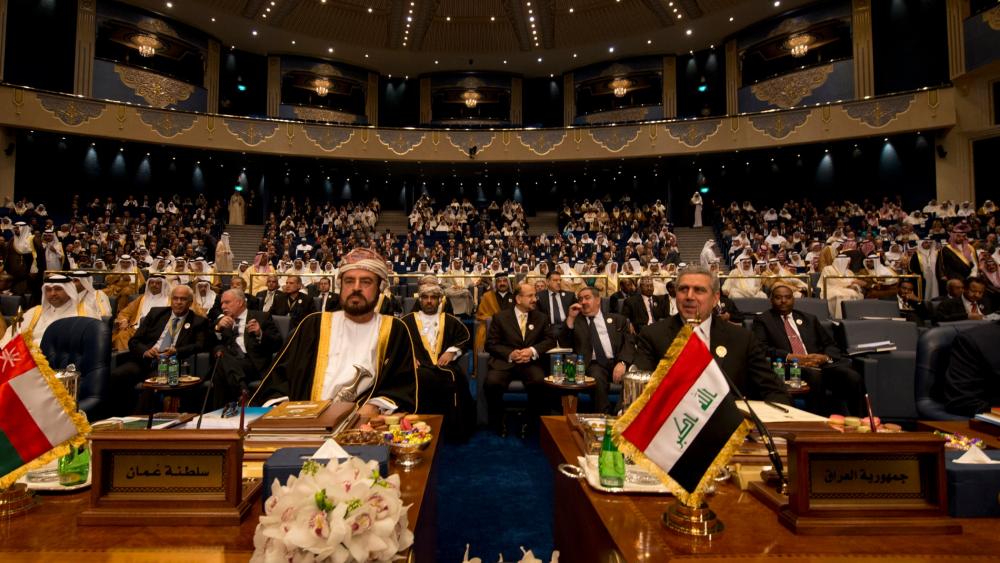 Saudi Arabia, Bahrain, Oman, and the United Arab Emirates refused even to attend the summit. Theirs, however, were not the only seats that remained empty. Algeria and Iraq insisted that the Syrian opposition not be allowed to represent Damascus officially (although Ahmad al-Jarba, the head of the Syrian National Coalition, was invited to address the gathering). And the countries that did attend might as well not have: The summit mainly served as an opportunity for speakers to exchange thinly veiled criticisms and accusations of regional destabilization. Even though officials inevitably hailed the “successful summit” and its “tangible results,” their rhetoric could not conceal the fact that the meeting.
Saudi Arabia, Bahrain, Oman, and the United Arab Emirates refused even to attend the summit. Theirs, however, were not the only seats that remained empty. Algeria and Iraq insisted that the Syrian opposition not be allowed to represent Damascus officially (although Ahmad al-Jarba, the head of the Syrian National Coalition, was invited to address the gathering). And the countries that did attend might as well not have: The summit mainly served as an opportunity for speakers to exchange thinly veiled criticisms and accusations of regional destabilization. Even though officials inevitably hailed the “successful summit” and its “tangible results,” their rhetoric could not conceal the fact that the meeting.
Following the self-immolation of the vegetable seller Mohammed Bouazizi on 17 December 2010, the demonstrations had spread rapidly, culminating in a large rally outside the interior ministry in Tunis on 14 January. On that day, facing huge opposition and a planned general strike, the president of Tunisia, Zine al-Abidine Ben Ali, fled. He has been holed up in Saudi Arabia ever since.Why was the apparent success of the Tunisian revolution followed by so many disasters? Can it really be true that a largely peaceful development, which inspired millions around the world, contributed to the situation faced today: internationalised civil wars in both Syria and Yemen, the rise of Islamic State, authoritarian rule in Egypt, the collapse of central government in Libya, and migrants risking all to flee these horrors?A short answer is that getting rid of a dictatorial and corrupt ruler is not enough. Building democratic institutions, and restoring confidence in a flawed state, are much harder tasks. It was a failure to understand this that led the US and Britain into their disastrous Iraq adventure in 2003. However, it is not only the neocons and their friends who need to learn this lesson. So do advocates and practitioners of nonviolent civil resistance, who have often concentrated on the task of getting rid of dictators with less thought and planning about what comes after.Tunisia itself remains, precariously, as the country that has achieved most political change since the Arab spring at the lowest human cost. The regime did not fall just because of Ben Ali’s departure. That was just a beginning. Within the country a long struggle began, not just to replace the most corrupt and incompetent adherents of the old regime but also to devise a new constitutional order. This took two years, and could only succeed because there was a measure of trust between the different parties involved.What factors made it possible for Tunisia to make a transition to a multiparty democracy? Two which have often been cited are the Tunisian army’s traditional apolitical ethos and Tunisia’s cultural affinity to Europe. But a third key factor, closely related to these two, was the remarkable role of the Ennahda party.Intended as a platform for sharing lessons learned in comparative experiences, the conference will engage policymakers, government officials, civil society leaders, victims groups, journalists, and academics from across the Middle East and North Africa region.Topics discussed will include truth-seeking, criminal justice, reparations, and the role of women in transitional justice, as well as considering means to prevent human rights violations in the future, with a special focus on judicial reform and vetting. Given the serious human rights violations taking place in Syria, Yemen and Bahrain, the conference will also consider changes awaiting these countries in light of civil societies' calls for justice. View the complete conference agenda here.According to ICTJ MENA Director Habib Nassar, the conference is designed to “initiate dialogue with representatives of Egyptian civil society, political movements, and government officials on the possibilities of transitional justice in Egypt through studying and analyzing the experiences of countries that have witnessed similar transitional conditions. This conference also aims to derive lessons from political developments and some justice initiatives adopted in other countries of the region.”For much of the last two decades, few Middle East experts gave serious consideration to Qatar, its governance structure or its decision-making process. The few and far away exceptions were scholarly articles, some admittedly very insightful, that noted Doha's mediation role in trying to solve various diplomatic puzzles, such as the Lebanese crisis of 2008 or the Sudanese civil war. With the uprisings that swept the Arab world in 2011, journalists, pundits and scholars started paying closer attention, as Qatar played a key role in several of the upheavals. For example, the state-owned Al Jazeera television network became the voice of many revolutionariesDoha's role in the Arab uprisings put a swift end to the lull in Qatar-related research. By 2012, the sprint was on to publish the first book on Qatar, and the last few years have witnessed an explosion of manuscripts in the United States, the UK and France. However, the quality of the work has varied widely. Most of the books published in the Anglo-American world were respectable, but usually focused on one aspect of the emirate, such as the "subtle nature" of Qatari regional power or the sustainability of its tribal sociopolitical order. Others were excessively academic and not accessible to a wide readership. Many publications on Qatar from France were either too descriptive and lacking in analysis or crossed into the territory of conspiracy theories.Having waited a few years, the respected scholar Kristian Coates Ulrichsen has published the first well-researched book assessing Doha's approach to the Arab uprisings. By taking his time, Ulrichsen was also able to consider the impact of two watershed events of the summer of 2013: the royal transition of power from Sheikh Hamad bin Khalifa Al Thani to his son Tamim and the coup d'état against Mohammad Morsi and his Muslim Brotherhood-led government in Egypt.Qatar and the Arab Spring is split in two equal parts followed by an epilogue. In the first section, Ulrichsen recounts the story of Qatar's rise from sleepy city-state to pivotal regional player with ties to international partners. The author takes a familiar route, retelling the story of how the discovery of oil and gas enabled Qatar to leap from a disenfranchised tribal society dependent on pearl trading to a globally connected metropolis. Ulrichsen then details how senior Qatari officials skillfully integrated their country into the rapidly changing international system. He focuses on five major elements: the nurturing of Al Jazeera, the positioning of Doha as an educational and cultural hub, the hosting of major international sporting events, the development of Qatar's tourism sector and the (ironic) attempt to present Qatar as an environment-friendly country. He then elaborates on the drivers of Qatari regional policies, correctly arguing that Qatar's mediation role and its balancing between regional powers such as Israel and Iran — is a calculated strategy of survival for a small state geographically caught between larger and more powerful neighbors.Diving into interesting granular details, Ulrichsen examines Qatar's foreign policy elite during the Arab uprisings. By "elites," he essentially means a handful of individuals: then-Emir Hamad bin Khalifa Al Thani, his prime and foreign minister, his second wife, and his then-heir-apparent Tamim bin Hamad Al Thani. Ulrichsen understandably concludes that having such a small number of senior policy makers helps to hasten the decision-making process, but, as several interviewed public- and private-sector employees told him, there is a "growing mismatch between leadership intent and diplomatic capacity"Ulrichsen starts the second part by describing how the lack of domestic constraints an essentially apolitical population — enabled Qatar to leverage its longstanding ties to Islamists and embrace the changes sweeping the Arab world, with the sole exception of Bahrain. He then dedicates a chapter to Qatar's approach to the Libyan and Syrian uprisings. According to Ulrichsen, the results of Doha's support for regional change have been more or less negative. For example, Qatari leaders' carefully guarded image as impartial brokers came to end when they tried to "pick winners," such as the Muslim Brotherhood. Ulrichsen also highlights the growing, but still very manageable, signs of domestic discontent against the ruling family's economic and social policies.In the epilogue, Ulrichsen recounts the peaceful transition of power from Emir Hamad to Tamim. Looking forward, the author believes that the new Qatari leadership will concentrate on domestic issues such as organizing the 2022 soccer World Cup and addressing the social malaise taking root within the indigenous population and on recalibrating its foreign policy by aligning itself closer to its fellow Gulf Cooperation Council (GCC) neighbors. Events taking place after the publication of the book have proven Ulrichsen right. In late 2014, Riyadh, Abu Dhabi and Manama agreed to return their ambassadors to Doha, bringing an end to an eight-month dispute over Qatar's support for Islamists. Likewise, earlier in 2015, Qatar joined the Saudi-led coalition against the Houthi-led government in Yemen.As a result, there are now two dominant narratives regarding the causes of the war. While they contain some grains of truth, both narratives are equally simplistic and thus, appealing for social media wars, but also quite misleading.One view promoted by the Syrian regime of Bashar al-Assad and its supporters holds that Western powers and Gulf regimes plotted the overthrow of the Assad government, instigated protests against it, and hired the rebels to do the job on the battlefield. In this telling, the conflict in Syria is primarily the byproduct of outside agitators.The second narrative holds that the underlying causes of the war can be explained by the legitimate grievances expressed by the Syrian people against the regime, and that they revolted against it in the era of Arab uprisings. This narrative demands that one view the violence against the regime as a byproduct of legitimate protest by ordinary Syrian citizens against their repressive dictator.Both sides are adamant about the validity of their narrative and the falsehood of the counternarrative. In reality, both narratives are rather valid simultaneously so.

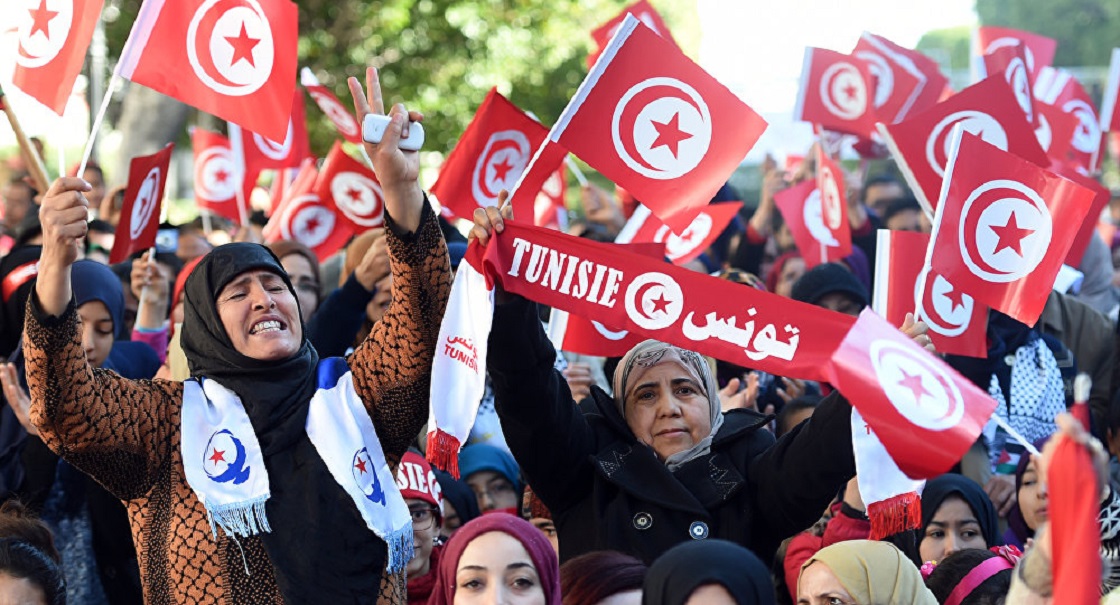
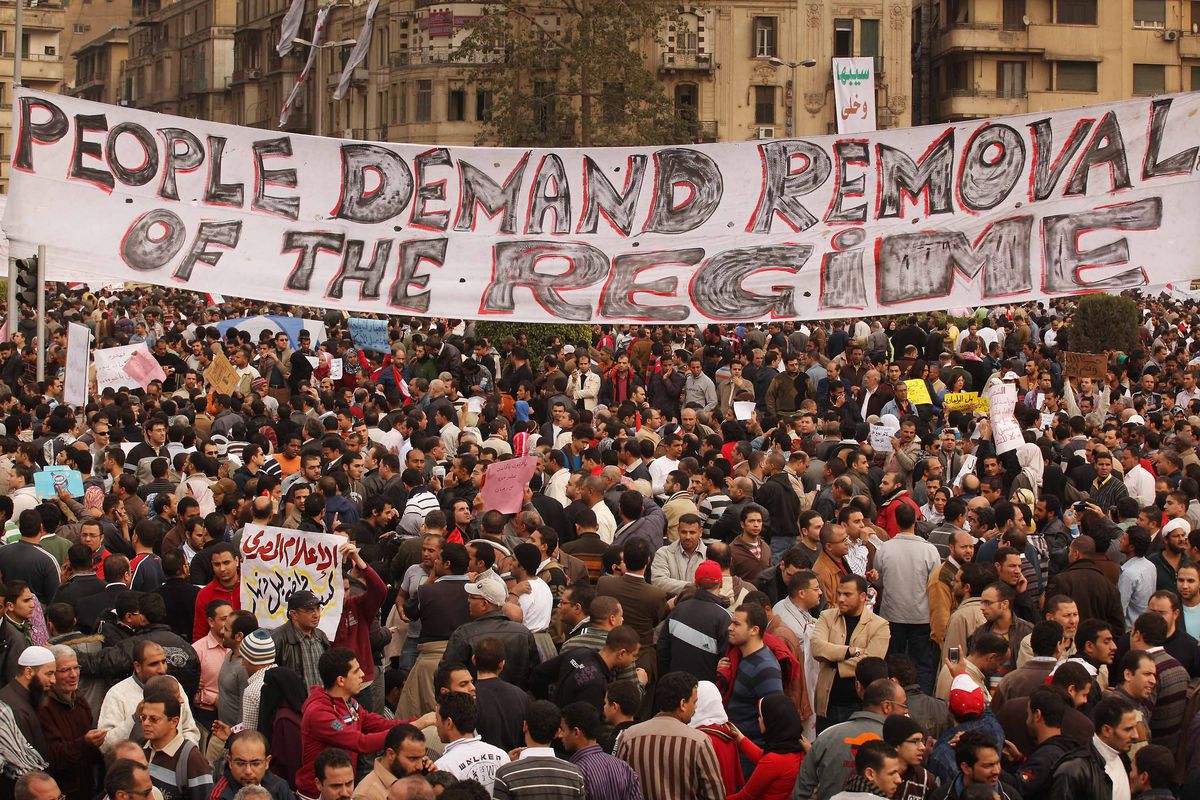
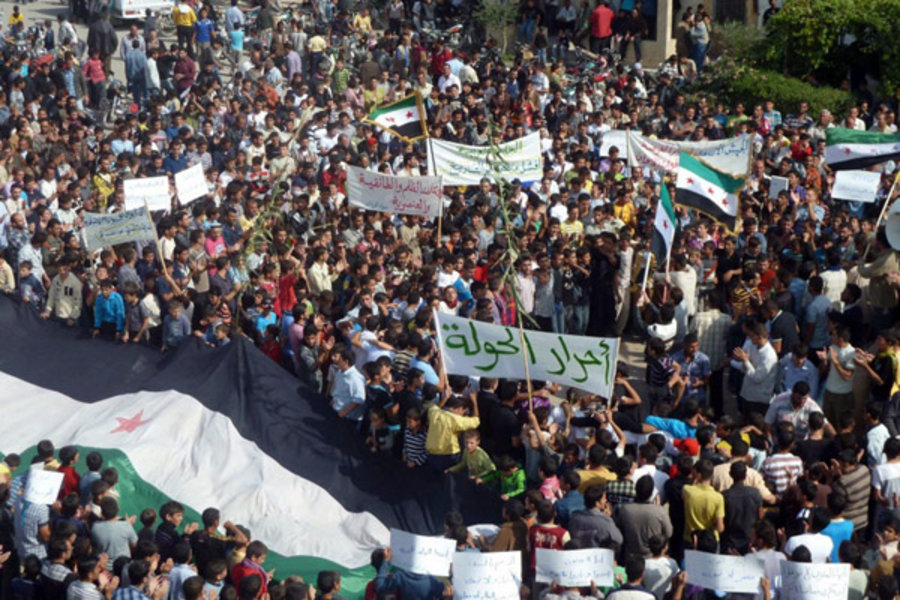 The Middle East is experiencing revolutions,the largely nonviolent pro-democracy insurrections that have swept the Arab world in recent months have succeeded in toppling dictators in Tunisia and Egypt and have threatened the survival of autocratic regimes in Yemen, Bahrain, and Syria. While even in Tunisia and Egypt there will undoubtedly have to be additional popular struggle to ensure that the overthrows of these US-backed autocrats could lead to real democracy, these revolutions mark a major triumph for Arab peoples and serve as yet another example of the power of nonviolent action.Syria's civil uprising against the rule of Bashar al-Assad, similar to those of Tunisia and Egypt, began in March 2011.
The Middle East is experiencing revolutions,the largely nonviolent pro-democracy insurrections that have swept the Arab world in recent months have succeeded in toppling dictators in Tunisia and Egypt and have threatened the survival of autocratic regimes in Yemen, Bahrain, and Syria. While even in Tunisia and Egypt there will undoubtedly have to be additional popular struggle to ensure that the overthrows of these US-backed autocrats could lead to real democracy, these revolutions mark a major triumph for Arab peoples and serve as yet another example of the power of nonviolent action.Syria's civil uprising against the rule of Bashar al-Assad, similar to those of Tunisia and Egypt, began in March 2011.
Following the self-immolation of the vegetable seller Mohammed Bouazizi on 17 December 2010, the demonstrations had spread rapidly, culminating in a large rally outside the interior ministry in Tunis on 14 January. On that day, facing huge opposition and a planned general strike, the president of Tunisia, Zine al-Abidine Ben Ali, fled. He has been holed up in Saudi Arabia ever since.Why was the apparent success of the Tunisian revolution followed by so many disasters? Can it really be true that a largely peaceful development, which inspired millions around the world, contributed to the situation faced today: internationalised civil wars in both Syria and Yemen, the rise of Islamic State, authoritarian rule in Egypt, the collapse of central government in Libya, and migrants risking all to flee these horrors?A short answer is that getting rid of a dictatorial and corrupt ruler is not enough. Building democratic institutions, and restoring confidence in a flawed state, are much harder tasks. It was a failure to understand this that led the US and Britain into their disastrous Iraq adventure in 2003. However, it is not only the neocons and their friends who need to learn this lesson. So do advocates and practitioners of nonviolent civil resistance, who have often concentrated on the task of getting rid of dictators with less thought and planning about what comes after.Tunisia itself remains, precariously, as the country that has achieved most political change since the Arab spring at the lowest human cost. The regime did not fall just because of Ben Ali’s departure. That was just a beginning. Within the country a long struggle began, not just to replace the most corrupt and incompetent adherents of the old regime but also to devise a new constitutional order. This took two years, and could only succeed because there was a measure of trust between the different parties involved.What factors made it possible for Tunisia to make a transition to a multiparty democracy. Two which have often been cited are the Tunisian army’s traditional apolitical ethos and Tunisia’s cultural affinity to Europe. But a third key factor, closely related to these two, was the remarkable role of the Ennahda party.The Tunisian success in getting rid of Ben Ali was followed in Egypt by the resignation of president Hosni Mubarak in February 2011, by Colonel Muammar Gaddafi’s death in Libya the following October, and by the departure of president Ali Abdullah Saleh from Yemen in February 2012. Four autocrats gone in just over a year. Tahrir Square, 2013. ‘Egypt saw an elected Muslim Brotherhood government thrown out by the army in a coup d’etat that had much popular support, but which has resulted in a regime that is no less authoritarian than Mubarak’s.The United States has a vital role to play in this process. For the last half century, Americans have influenced the politics of the Middle East, often with damaging consequences. That is a history, above all, the United States must not replay. It is time we learned from our past errors. We should refrain from supporting strong-man dictators who promise to protect our interests. They rarely fulfill their commitments, and they always inspire resentment and resistance. We also should avoid quick fixes, from regime change to large investments in economic development. Syria's crisis has entered uncharted waters with the country's suspension from the Arab League. But it is far from clear whether the dramatic shift in the regional mood will change wider international attitudes to intervention.The complex mixture of cultures and peoples in the region is not susceptible to change on a rapid (American) timetable.These historical warnings, however, should not become a justification for passivity. As bad as some of the previous American efforts in the region have turned out, things have only been worse when the United States stayed away. One of the biggest problems in places like Yemen, Lebanon, and Somalia is that Washington has allowed local thugs and extremists to hijack political authority. Without American support, it is very hard for well-intentioned reformers to challenge ruthless figures who control the guns, the roads, and the oil.Savvy and select American intervention should accompany the restraint and humility that history teaches all visitors to the Middle East. We can group the appropriate United States policies into three areas: interpersonal, intergovernmental, and intergenerational. Each includes issues that directly benefit both Americans and Middle Eastern residents. Each offers low risk and high reward. American policies require courage, vision, and some creativity qualities that have been absent from deliberations in Washington since the beginning of the Arab Spring.From Syria to Arabia to Morocco, Arab people denounce the dispiriting reality of the Arab League knowing that it is a reflection of uneven relations between most Arab states. Actually, the general political, economic and cultural levels of cooperation between many nations are below the baselines of ordinary formal relations. Nonetheless, when it comes to state-relations among one ethnic group of countries or league of states, Arab-Arab relations are very frail despite the flimsy cosmetic role of the Arab League.
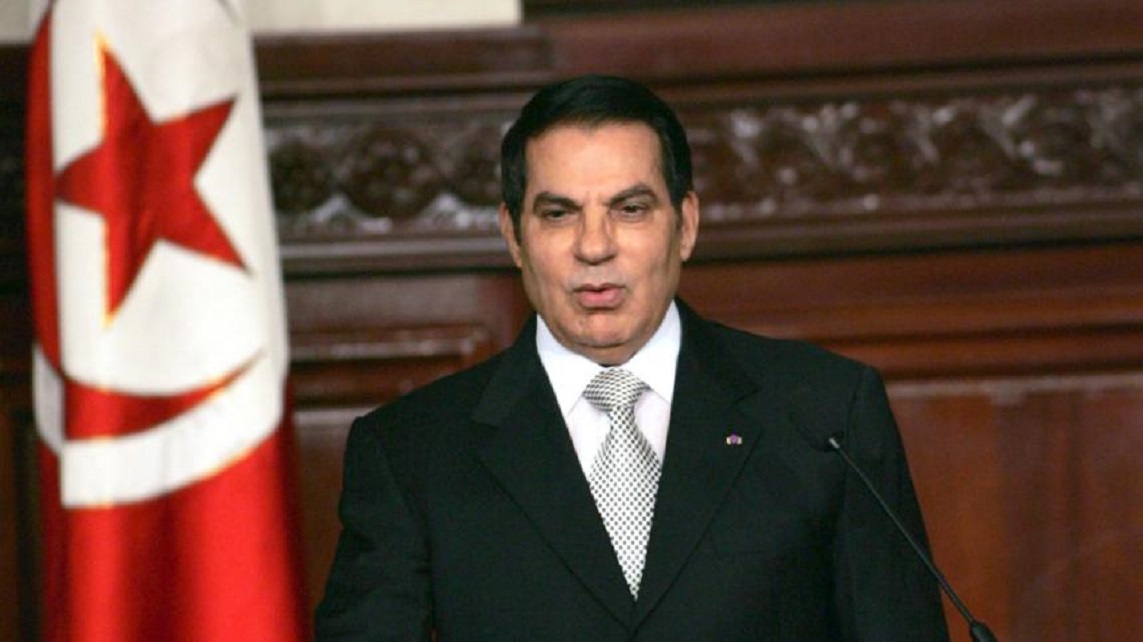 Ben Ali resigned three weeks after protests started and fled Tunisia for Saudi Arabia. He and his wife Leila were tried in absentia on charges of corruption, theft and unlawful possession of cash and jewellery. They were found guilty and sentenced to 35 years in prison in June 2011.Tunisia asked Saudi Arabia to extradite Ben Ali and his wife. The Saudis ignored the request.
Ben Ali resigned three weeks after protests started and fled Tunisia for Saudi Arabia. He and his wife Leila were tried in absentia on charges of corruption, theft and unlawful possession of cash and jewellery. They were found guilty and sentenced to 35 years in prison in June 2011.Tunisia asked Saudi Arabia to extradite Ben Ali and his wife. The Saudis ignored the request.
